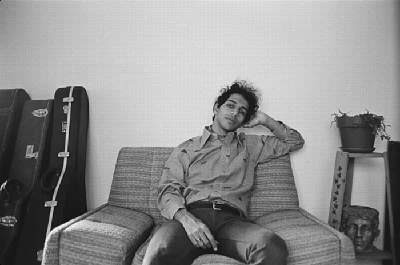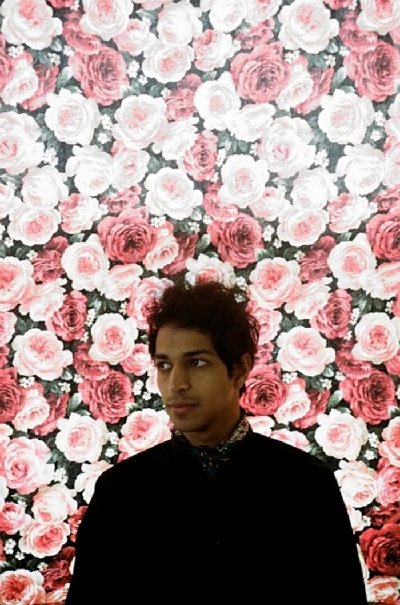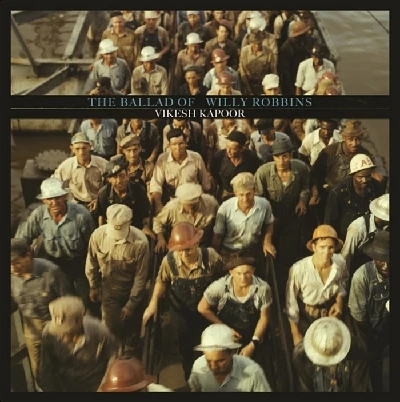published: 18 /
4 /
2015

Owen Peters talks to Oregon-based singer-songwriter Vikesh Kapoor about his Indian heritage and his debut album and concept record, ‘The Ballad of Willy Robbins’
Article
In order to access the room where Vikesh Kapoor is about to play here at The Islington - London, punters pass through a red curtain. Once inside, the dimly lit stage is swathed in red shadowy lights. As one wag comments, “This reminds me of my stag night in Amsterdam.”
Kapoor is playing his penultimate gig before heading to his US home in Oregon. He’s been headlining a month of gigs primarily in Ireland, both sides of the border. Then he has been north to Newcastle, south to Brighton and made various middle England stops along the way.
From a UK perspective he came onto most people’s radar when supporting the Handsome Family on their 2014 UK tour. Some years earlier it was his performance at Howard Zinn’s memorial service in Boston Massachusetts which brought him to the attention of US music fans.
Collectively audiences from both sides of the Atlantic are agreed on the quality and diversity of his critically acclaimed debut album, ‘The Ballad of Willy Robbins’. He tells me the story of how the album came about as we talk in his basement dressing room before he’s due on stage.
“The idea began when I saw a newspaper story of a construction worker who’d lost his job. The character of Willy Robbins is fictional. I first started writing ‘The Ballad of Willy Robbins’ back in 2008. It took a while for the song to come to me in its entirety.”
“What I was writing about had played out in front of me each and every day as I was growing up. It’s a visceral thing. The songs aren’t autobiographical. They aren’t about me.” When I check if any songs touch on his own emotions at the time, he says that ‘Bottom of the Ladder’ did. “If anything I was working out did I want this way of life? The song was asking the same questions of Willy as I was asking myself.”
“My upbringing was in and around a small town in Pennsylvania; the total population would have been around 9,000 folks. It had one High School; we were one of the only Indian families in town. I had a good childhood, but even from an early age I felt apart, kind of removed. I was growing up as a first generation immigrant, (his parents originating from India) so it was like having a foot in both cultural worlds.”
“Remember” he tells me “this was pre-internet, I had lots of down time. It was easy to be on your own, left to your own devices.”
Kapoor is neat, tidy and precise, completing every action with simplicity and accuracy. He notices a piece of cotton on his woollen suit, removing it as would a lepidopterist a butterfly. His facial profile gives little indication of age. He’s just turned thirty, but he could as easily be twenty-five. Worry, woman or whiskey doesn’t seem to have entered his domain yet.
I ask him to tag his album against a musical genre. He says, “Folk music,” without a moment’s hesitation. “That doesn’t mean to say my next album (he pauses for the title) won’t be a bunch of simple love songs. Who knows? It will be whatever takes me when the time comes.”
Willy Robbins is a blue collar worker. He wants routine, he doesn’t want change. His wife’s frustrations are eloquently defined in various songs. “She doesn’t respect him anymore/He’s not the man he was.” Her life is falling apart, but he can’t see it.
“Are you trying to represent the working class in your songs? Are you pushing at social and political activism in any way?” Again he’s quick with an answer. “No, this is a story of people whose lives aren’t working out, or something has sent them off course. It’s a not a stance on politics or social class. It’s a story.”
“Listen I know this album polarises people. I’ve played venues where teenagers have come to me in tears. They said, ‘That guy you sang about, he’s my Dad’. Then other times folks say, ‘Why are you hacking Dylan?’ Which is strange as I didn’t hear of Dylan until I was 21. So, at least my music is getting a reaction.”
From Pennsylvania, Kapoor moved to Boston University, studying English Literature. He says, not surprisingly, “I struggled adapting to the size and speed of Boston. It was a shock. Everyone seemed to know so much more than I did about everything.” Kapoor doesn’t smile much. When he does, it’s warm and sincere. This is one of those occasions.
In grade school he took piano and guitar lessons: “I wasn’t very good at keeping up with the classes,” he admits. He, however, knew his way around a guitar well enough to get involved with punk bands whilst settling into university life.
I ask when and how did he make the change from punk to playing acoustic guitar?
“It was just trial and error, trying different chords, different songs. To be honest I’d like to be better on the guitar, I’d call myself proficient rather than anything close to outstanding,” he says self-effacingly.
“I like a whole range of music and musicians. Nina Simone, she mesmerizes me, I never tire of hearing her songs. John Jacob Niles has been an influence. More contemporary artists I’d say, Tom Waits, Leonard Cohen, and for sure Pete Seeger. He could sing love songs, ballads and had the ability to construct a protest song which resonated with his audiences.”
The clock is ticking. We are running out of time before he needs to get on stage. We talk about his future plans.
“The album has been available back home around eighteen months, in Europe about a year. I want to make time and space to start writing. It’s important I write songs which stand the test of time. It’s the likes of Tom Waits that I admire. He worked through difficult periods during his early career. He worked hard believing in himself. I want to show that type of belief and passion in my own material.”
Once on stage Kapoor checks microphone stands, leads, lighting, his guitar, even the audience. I’m sure some actions are by habit or ritual, others simply his attention to detail. He’s ready.
His depiction of a man down on his luck and struggling with the injustices of his world are epitomised in ‘Bottom of the Ladder’. He delivers a heaviness and toil to the song with his laconic chord changes. He’s in a place as he states,”…Where the moon sets the sunrise forever”
The title track from ‘’The Ballad of Willy Robbins’ is exactly as described during our interview, personal, intense and heartfelt. Kapoor’s gentle vocals confirm a song in need of not just hearing, but listening to as Willy decides to work for no pay due to a deceitful employer. The monotony, routine and oppression of his life are captured by a Kapoor’s use of the Greek mythological character Sisyphus, a man who was condemned to an eternity, rolling a boulder up a hill only to watch it roll back down again. It reminds me of an old Jackson Browne line: “When the morning light comes streaming in/I’ll get up and do it again.”
Yet it’s his wife Margaret, who has reached breaking point. There will be no more cleaning and tidying. The bedroom is dusty, the bed sheets unmade. “The man she married she no longer admired.”
Not only is Willy’s loss of dignity perfectly captured, but the breakdown of their marriage.
When the song finishes the applause feels like an intrusion. Willy and Margaret are in the room.
Kapoor is joined on stage by John Blek who has been his support act throughout the tour for the song ‘I Dreamt Blues’. Its poignancy confirms Willy’s loss of hope. “Does my word matter anyway?”...his tethering to work resulting in “My souls replaced by machines.”
The song ‘I Never Knew What I Saw in You’ is confirmation that his wife’s love for him has passed, and with it her life.
I particularly liked the clever way Kapoor’s falsetto rendition throughout the chorus allowing Margaret's voice to be heard in full: “I never knew what I saw in you/I wait at home/Times take their toll.”
At his first attempt Kapoor has put together what could be an iconic album. This live performance is intense and personal. How could it be anything else with the relationships and characters that he is sharing?
He now has questions ahead of him. Can he produce a second album to match or better the searing quality of his debut? How does he reach wider audiences and perform in larger venues?
Those questions are for the future. For now you can listen to an outstanding album and watch Vikesh Kapoor at close quarters when he plays live.
The latter may not be an option as his career moves forward.
Band Links:-
http://vikeshkapoor.com
https://www.facebook.com/vikeshkapoor
https://twitter.com/vikeshkapoor
Picture Gallery:-

